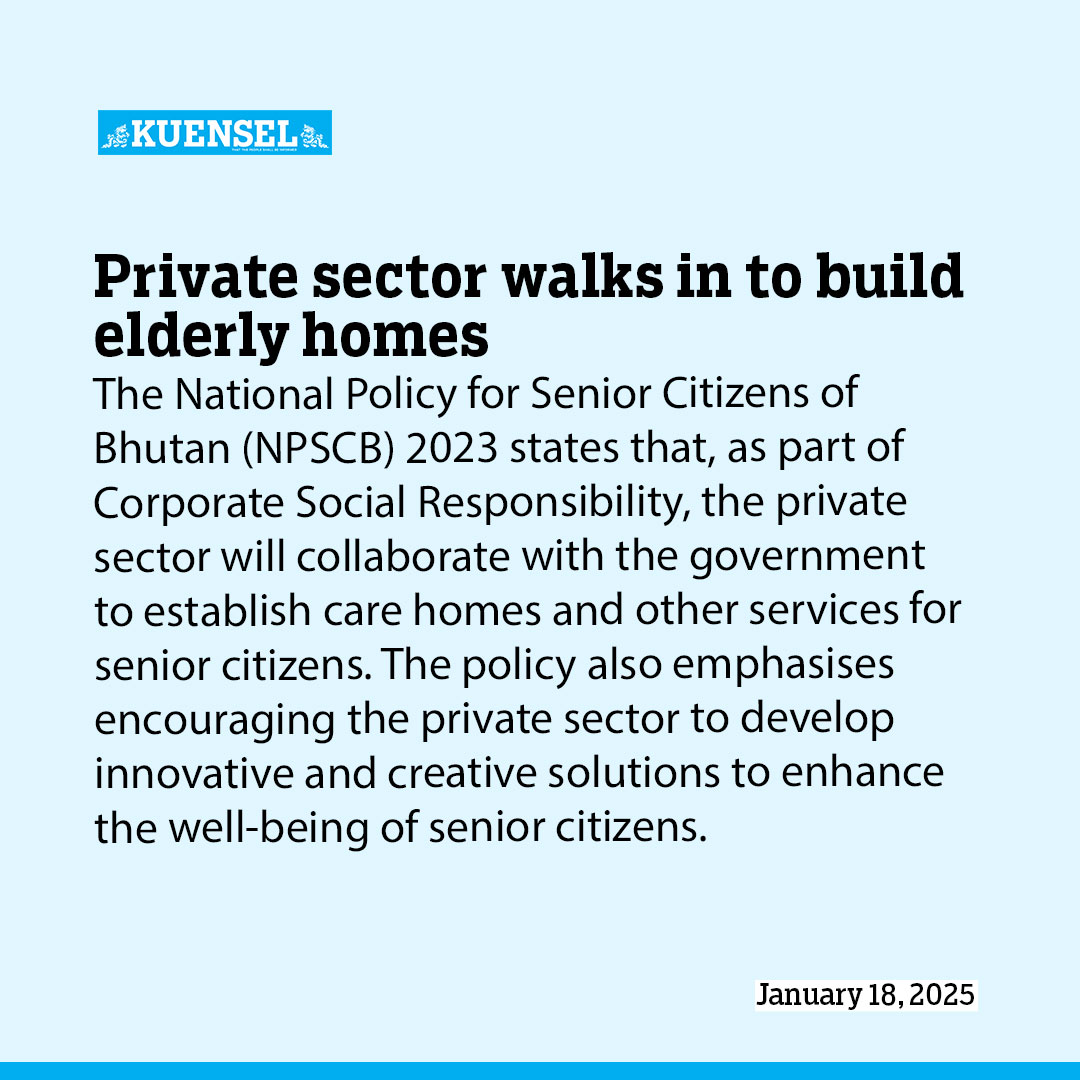Thinley Namgay
The National Policy for Senior Citizens of Bhutan (NPSCB) 2023 states that, as part of Corporate Social Responsibility, the private sector will collaborate with the government to establish care homes and other services for senior citizens.
The policy also emphasises encouraging the private sector to develop innovative and creative solutions to enhance the well-being of senior citizens. In Bhutan, individuals aged 60 and above are classified as elder citizens under the policy.
According to Tshering Namgay, the Executive Director of the Royal Society for Senior Citizens (RSSC), the primary role of the private sector could be to develop infrastructure tailored to the needs of the elderly.
He added that the private sector’s involvement would extend beyond establishing elderly homes to include creating user-friendly toilets, installing lift systems in buildings, and ensuring accessibility in public spaces, among other initiatives.
Many believe that the ongoing demographic transition, modernisation, and migration are undermining traditional household support structures, leaving some elderly people without basic necessities such as shelter.
Tshering Namgay observed that the neglect of elderly citizens by their children and family members has become evident in some cases in Bhutan.
“The traditional family system is changing. One contributing factor could be the exodus to other countries. Today, some children and family members are unable to provide support due to various circumstances,” he said.
Is it a concern?
The growing elderly population is a concern for many. In 2022, individuals aged 60 and above made up 9.5 percent of the population, a figure expected to rise to 19.7 percent by 2047. Similarly, those aged 65 and above represented 6.6 percent in 2022, with projections indicating an increase to 13.4 percent by 2047.
Additionally, the ageing index, which tracks the number of individuals aged 65 and above for every 100 children under 15, is expected to rise dramatically from 28 in 2022 to 78.5 by 2047.
Currently, only a few organisations provide services to the elderly. Among civil society organisations, the RSSC is the sole entity dedicated to supporting elderly citizens.
Under RSSC, there are around 180 contributing members and around 60 non-contributing members.
Besides RSSC, the Office of the Gyalpoi Zimpon and Zhung Dratshang also look after elderly citizens who require help.
Current status
Currently, there is no available data on the number of elderly citizens in Bhutan or how many are in need of basic necessities such as shelter.
At the retreat centre of the RSSC in Begana, Thimphu, 17 elderly individuals are cared for by the organisation. RSSC built a shelter for them in 2015 and provides health services. In terms of food, assistance is provided by Zhung Dratshang and relatives.
The Goensho Tshamkhang in Wangsisina, Thimphu, is managed by the Office of the Gyalpoi Zimpon. The elderly residents there have no children and engage in religious activities. RSSC has also collaborated with the Office of the Gyalpoi Zimpon, sending some elderly individuals to the center.
So far, RSSC has not partnered with other private organisations supporting the elderly, such as Karma Kelvin Group, because it is not a registered entity. However, RSSC’s Executive Director Tshering Namgay expressed the organisation’s interest in collaborating in the future.
Policies for elderly citizens
Bhutan has good policies in place, both nationally and internationally, related to the elderly population in the country.
The NPSCB 2023 is the key policy.
The Constitution of Bhutan mandates the State to safeguard the integrity of the extended family system and community life.
Bhutan is a party to the United Nations Principles for Older Persons, adopted by the UN General Assembly in 1991.
Bhutan is one of 160 UN Member States that has endorsed the Madrid International Plan of Action on Ageing, 2002. This plan aims to address issues related to development, health, well-being, and the creation of supportive environments for elderly citizens.


